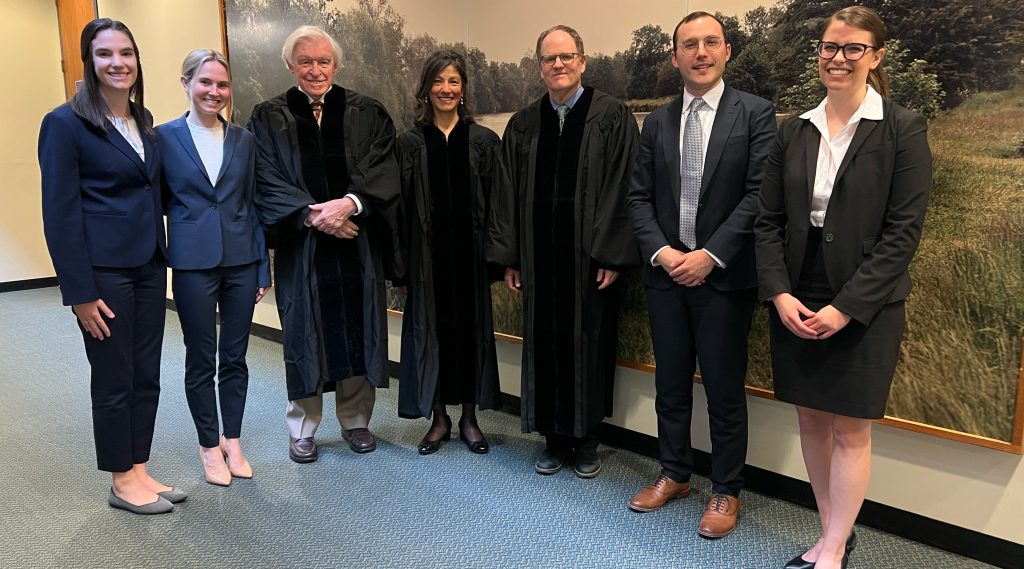The 63rd Annual Wendell F. Grimes Moot Court Competition was held on April 19, and marked a much-awaited return to an in-person competition following the pandemic. The student teams of Anna Hunt ’24 and Erica Cagliero ’24, representing the Petitioner, United States; and Jordan McGuffee ’24 and Josh Procario-Foley ’24, representing the Respondent, prison inmate, skillfully navigated the tricky pathways of a case involving the reach of the prison mailbox rule. The rule which was first announced by the Supreme Court in Houston v. Lack, and later codified in the Federal Rules of Appellate Procedure, deems that an incarcerated individual’s notice of appeal is considered filed when it is delivered to the prison authorities for mailing, not when the notice of appeal is received by the court.
The fictional United Stated Supreme Court case which the students argued arose out of a prison inmate’s claim brought under the Federal Tort Claims Act (FTCA) for injuries sustained at the hands of fellow prisoners while guards either participated in the assault, or did nothing to stop it. The inmate, who was nominally represented by counsel, had deposited his claim in the prison mailbox six days before the statute of limitations for filing with the Bureau of Prisons (BOP) was due to expire, but the BOP did not receive the inmate’s claim until three days after the statute of limitations had expired. The BOP denied the inmate’s claim as untimely. The district court agreed and ruled (1) that the prison mailbox rule did not apply to claims brought under the FTCA, and further held (2) that even if it did, the inmate was represented by counsel at the time of the filing and thus was not entitled to its benefits. The circuit court reversed and the Supreme Court granted review to resolve the circuit splits on both issues.
In front of an esteemed and active bench comprised of Justices Dalila Argaez Wendlandt of the Massachusetts Supreme Judicial Court, William P. Robinson III ’75 of the Rhode Island Supreme Court, and Gregory I. Massing of the Massachusetts Appeals Court, the teams vigorously argued their respective client’s positions on both issues and thoughtfully handled the justices’ many questions with aplomb.
In her remarks preceding the panel’s decision that the team of Jordan McGuffee and Josh Procario-Foley were victorious, Justice Wendlandt praised all four student litigators saying that they were as well prepared as many of the attorneys who appear in her courtroom. The two other members of the panel concurred in her assessment and sang both teams’ praises as well. The justices also named Jordan McGuffee as best oralist.
The general competition is overseen by BC Law’s Director of Advocacy Programs, Rosemary Daly ’87. This year’s finalists competed in four intense levels of competition leading up to the final round.
Photo: from left, finalists Erica Cagliero and Anna Hunt; judges Hon. William P. Robinson III, Dalila Argaez Wendlandt, and Gregory I. Massing; and winners Josh Procario-Foley and Jordan McGuffee


